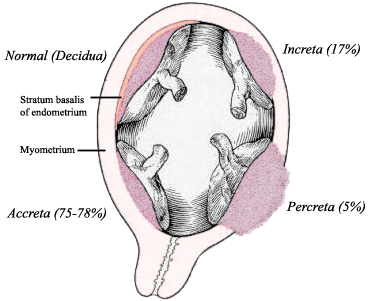Placenta accreta is a condition that occurs when the placenta attaches too strongly onto or too deeply into the uterine wall. There are different levels of severity which fall under the overall category of placenta accreta spectrum (PAS) disorders (accreta, increta, percreta). In a typical pregnancy, the placenta attaches to a thin inner layer of the uterus that is then sloughed off during birth of an infant. This allows the placenta to separate from the uterine muscle and be expelled.

- Accreta: the placenta attaches abnormally and is too adherent to the uterus
- Increta: the placenta invades and involves the uterine muscle
- Percreta: the placenta grows into and through the uterine wall, and may attach to nearby organs such as the bladder
MAPS: Multidisciplinary Approach to Placenta Service
The UCSF MAPS team works together to diagnose and care for women with PAS. The UCSF approach features:
- Collaboration with multidisciplinary teams
- Pre and post delivery team huddles
- Radiology/pathology/surgery correlation
Faculty Members
Jocelyn Chapman, MD, FACS, FACOG Associate Professor, Multidisciplinary Accreta Program Co-Director, Gynecologic Oncologist
Arianna Cassidy, MD Assistant Professor, Multidisciplinary Accreta Program Co-Director,
Maternal-Fetal Medicine
Jo Anne Gras, DO Clinical Professor, Academic OB/Gyn Hospitalist
Juan M. Gonzalez Velez, MD, PhD Professor, Maternal-Fetal Medicine Division Director and Center for Complex Maternal Care Director
Naghma Farooqi, MD Professor, Director of Labor and Delivery, Director of CODA for Gyn, GME site director for Gyn
Vasiliki Tatsis, MD, MS, MBA Associate Professor, Hospitalist Program Director, Director of Ob/Gyn Fellowship
Tushani Illangasekare, MD Assistant Clinical Professor, Obstetrics, Gynecology and Gynecologic Surgery, Assistant Ob/Gyn Residency Program Director, Director of Ob/Gyn Simulation
The UCSF MAPS team includes providers from the following disciplines:
- Obstetrics
- Gyn Oncology
- Interventional Radiology
- Maternal-Fetal Medicine
- Obstetric Anesthesia
- Pathology
- Nursing
